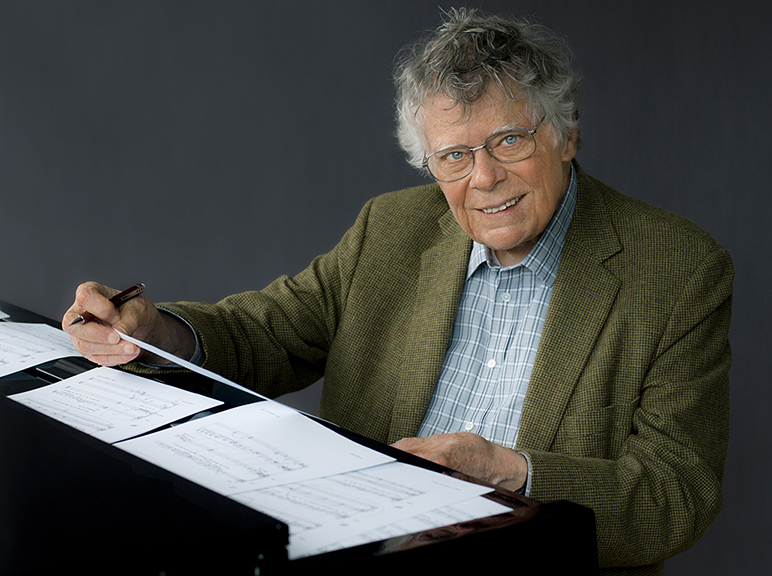Biography
Gordon Getty is a beloved master of form and tradition, much like the protagonist of his latest opera, Goodbye, Mr. Chips. Unlike the titular schoolteacher, Getty marries the traditional with an original compositional voice, creating a synthesis of the old and the new. The composer’s music has impacted audiences across North America, Europe and Asia. His compositions for orchestra, chorus, vocal and instrumental soloists, and chamber ensembles, as well as his operas, have been praised as “highly atmospheric” and “utterly entrancing” (Fanfare Magazine).
Getty’s Goodbye, Mr. Chips premiered in cinematic form in November of 2021 at the Mill Valley Film Festival, in partnership with Festival Napa Valley. It has since been screened by New York City Opera, Opera Company of Philadelphia’s Festival O22, and Opera America. His first opera, Plump Jack, premiered with the San Francisco Symphony in 1984. His Usher House premiered at the Welsh National Opera in 2014, followed by a production at the San Francisco Opera. Getty’s The Canterville Ghost was originally produced by the Leipzig Opera in 2015, and was afterwards joined with Usher House as the double bill “Scare Pair” in productions at Los Angeles Opera and the Center for Contemporary Opera in New York City. Plump Jack, Usher House, and The Canterville Ghost have all been released on SACD by the audiophile label Pentatone, which will release Goodbye, Mr. Chips in early 2024.

Getty’s Joan and the Bells, a cantata setting of the trial and execution of Joan of Arc, has enjoyed productions throughout Russia, Germany, France, and England, as well as throughout the US. A graduate in English literature from the University of San Francisco and a longtime poet, Getty penned his own libretto for Joan and the Bells, as he did for all of his operas.
Works for chorus can be found on three Pentatone recordings: Young America, The Little Match Girl, and Beauty Come Dancing, and alongside works by other contemporary composers on December Celebration.
Getty’s oeuvre includes many works for solo voice. The most widely performed among them is the song cycle The White Election (1981). This collection of 31 poems by Emily Dickinson, set for soprano and piano, has been presented at such venues as Lincoln Center, the Kennedy Center, and the Hermitage Theatre in St. Petersburg, and has been recorded both on Delos (by Kaaren Erickson) and on Pentatone (by Lisa Delan).
Pentatone also released recordings of Getty’s Orchestral Works in 2010, with Sir Neville Marriner conducting the Academy of St. Martin in the Fields, and of Conrad Tao performing the composer’s Piano Pieces in 2013, later showcased by the pianist at New York’s Weill Recital Hall. His oft-performed Ancestor Suite was staged by the Bolshoi Ballet, and it was later performed by Bolshoi dancers with the Russian National Orchestra in Moscow, Beijing, Shanghai, and the US.

Gordon Getty’s life in music is the subject of Peter Rosen’s documentary There Will Be Music, premiered in 2016 and screened widely at festivals and in theaters. He has been awarded the Gold Baton of the American Symphony Orchestra League and was honored as an Outstanding American Composer at the John F. Kennedy Center for the Performing Arts. In 2019, he received the European Culture Prize, and in 2020 he was announced as Legacy Honoree and Artist in Residence by the Young People’s Chorus of New York City. In that same year, Opera America named Getty as one of ten inaugural inductees to the Opera Hall of Fame, alongside Dawn Upshaw, Grace Bumbry, David Gockley, and Simon Estes, among other opera luminaries.
The composer’s work is published by Rork Music.
Photo Credits
- Gordon Getty B&W in leather jacket (© Lisa Kohler)
- Gordon Getty in green plaid jacket (© Gian Andrea di Stefano)
- Gordon Getty with piano (© Emily Polar)